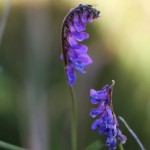SBE Graduate Students present in Graduate Student Research Awards Competition!
College of Natural Science, Forestry & Agriculture will be holding a Graduate Student Research Awards Competition on February 27th in Room 57, Stodder Hall!
 SBE Graduate Students Corianne Tatariw and Eric Venturini will be presenting between 11 and 12.
SBE Graduate Students Corianne Tatariw and Eric Venturini will be presenting between 11 and 12.
Faculty, staff, graduate and undergraduate students are encouraged to attend!
Schedule:
10:00 Opening
10:10 The application of spatial modeling tools to predict abundance and assess landscape factors that impact native bees in Maine’s lowbush blueberries—Shannon Chapin, Department of Wildlife Ecology
10:30 Smolt phenology and effects of dams on the success of Atlantic salmon smolt migrations in the Penobscot River, Maine—Dan Stich, Department of Wildlife Ecology
10:50 The effects of high pressure processing on the quality and functionality of abalone meat— Brianna Hughes, School of Food & Agriculture
11:10 10 minute break
11:20 The effects of long term atmospheric nitrogen deposition on functional soil microbe communities— Corianne Tatariw, School of Biology & Ecology
11:40 Enhancing native pollinators in Maine’s lowbush blueberry fields: What to plant and how to plant it—Eric Venturini, School of Biology & Ecology
12:00 Direct simultaneous detection of various shiga-toxin producing Escherichia coli strains by an optical sensing method using Oligonucleotide-functionalized Gold Nanoparticles—Irwin Quintela, School of Food & Agriculture
12:20 10 minute break
12:30 Recent climate change compared to the rapid warming at the end of the last ice age: insight from the glacial moraines of New Zealand—Toby Koffman, School of Earth & Climate Sciences
12:50 Predicting high quality sites of black ash (Fraxinus nigra) across Maine and northern New York: An approach to prioritizing preparedness and management of emerald ash borer (Agrilus planipennis)— Kara Lorion, School of Forest Resources
1:10 Developing valley glacier flow models to estimate stability over the Holocene—Seth Campbell, School of Earth & Climate Sciences
